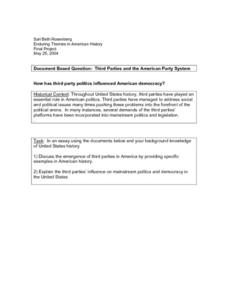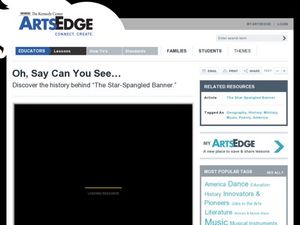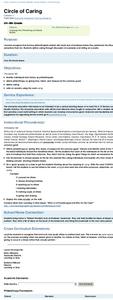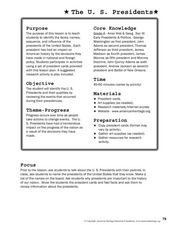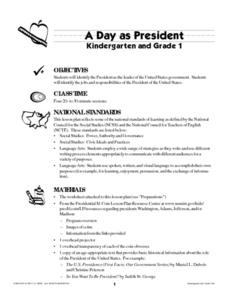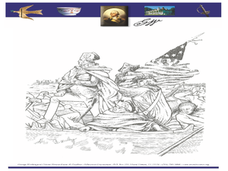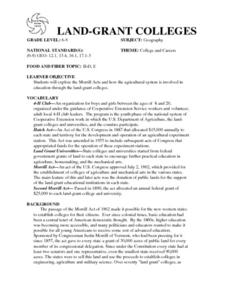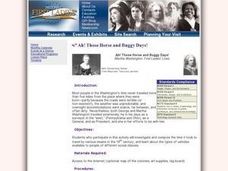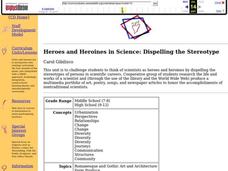Curated OER
Characteristics and Functions of Money
Fourth graders discuss the function and characteristics of money. For this financial education lesson plan, 4th graders read the book The Go-Around Dollar by Johnston Adams. This book sparks a conversation on how money is used and the...
Curated OER
Presidents
Students identify the qualities needed to become President of the United States. Using the internet, they discover the differences in character of past presidents and draw conclusions about their time in office. They relate a piece of...
Curated OER
Can Anyone Be a Leader?
Students explore the concept of leadership and identify leaders from the past and present. They brainstorm qualities of effective leaders, research a leader from the past and develop a presentation on their findings and choose a local...
Curated OER
Third Parties and the American Party System
Twelfth graders examine the role of third parties in American politics. Individually, they use primary source documents to write an essay on how third parties emergered and why. They also discuss the influence third parties have on...
Curated OER
Mail Call!
Students explore the National Postal Museum through an interactive program. They explore how a stamp design gets proposed and who designs them. They also examine the history of the postal service.
Curated OER
Oh Say Can You See?
Students discover the meaning of patriotism through literature, songs, and poetry. They also identify patriotic symbols and activities such as the flag, the Pledge of Allegiance, the Star Spangled Banner, the bald eagle, and monuments.
Curated OER
Circle of Caring
Students examine lives that have been lived for the positive good of others. In this philanthropy lesson plan, students discuss famous philanthropists and what they have in common. Students define philanthropy, discuss what caring means...
Curated OER
Circle of Caring
Pupils explore the concept of philanthropy. For this service learning lesson, students study the works of well-known philanthropists and write an acrostic poem using the word CARING.
Curated OER
Being Me in the Face of Adversity - Americans Who Stood Up for Their Beliefs
Students identify important Americans from the colonial, revolutionary and slavery periods who are noted for standing up for their beliefs in the face of peer disapproval. They identify the importance of music in motivating and...
Curated OER
Americans Who Stood Up for Their Beliefs
Students will reflect upon the use of music to teach lessons throughout history. The focus of the study is based upon early American History. The tie of music and the abolition of slavery makes for interesting inquiry for learners.
Curated OER
Paper Vests
Second graders listen to background information on designated Black Americans and read some books about them. They choose one of the persons studied and create a paper vest relating the person's contributions.
Curated OER
The U.S. Presidents
Students identify the Presidents of the U.S. by their physical characteristics and their impact on America. In this Presidents lesson plan, students read about each President, look at their pictures, and identify each of them based on...
Curated OER
Symbols of Freedom
Students display knowledge of historical facts regarding the American Flag as they use creative writing skills.
Curated OER
Acceptance Through Patchwork
Students are asked to look at differences in people and accept those differences but to examine that people are more alike than different. The lesson has the central focus of investigating diversity.
Curated OER
The Greatest Show on Earth: Then and Now
Students explore the history of the circus in the United States. They explore the life of John Bill Ricketts, founder of the first circus. Students compare Ricketts' first circus to the modern circus.
Curated OER
The Constitution: Drafting a More Perfect Union
Students analyze an unknown primary source document to determine its origin. In this Constitution lesson, students read primary source documents and contrast and compare the evolution of the drafts of the Constitution. Students analyze...
Curated OER
A Day as President
Youngsters identify the President as the leader of the United States government, as well as learn about the jobs and responsibilities of the head of the executive branch. Including a simple printable and detailed instructional points,...
Curated OER
Crossing the Delaware River Coloring Sheet
In this Crossing the Delaware coloring worksheet, students read a passage about the crossing, then color a picture of the scene.
National First Ladies' Library
Dolley The Hero
Learners engage in a instructional activity that focuses on the events of the War of 1812. They conduct research using a variety of resources that includes the internet. Students then find images on the internet and then draw one of the...
Curated OER
Land Grant Colleges
Students are introduced to the concept of land grant colleges which allowed agriculture to be brought into education. As a class, they create a timeline and compare and contrast the land grant colleges of 1890 and 1892. They use maps...
Curated OER
The Uluburun Shipwreck Project: Interconnections through Trade in the Late Bronze Age Mediterranean World
Ninth graders examine causes and effects of the Uluburun shipwreck. In groups, they develop their own ways to categorize the artifacts found on the ship and decide on the research questions they are going to focus on. They use the...
National First Ladies' Library
Ah! Those Horse and Buggy Days!
Students discuss contemporary methods of travel and the time it takes to travel to places. They use the Internet to explore 18th century travel. Students work in small group to research the amount of time it would have taken...
Curated OER
Everybody Needs Somebody
Students brainstorm feelings words and discuss what causes us to have feelings. Using artwork, they discuss how different artists show feelings and emotions. Using the internet, they research how other cultures express their feelings and...
Curated OER
Heroes and Heroines in Science: Dispelling the Stereotype
Young scholars describe and illustrate a stereotypical scientist. They work in cooperative groups to research and produce a portfolio of work honoring a randomly chosen nontraditional scientist. Students create a presentation about...





